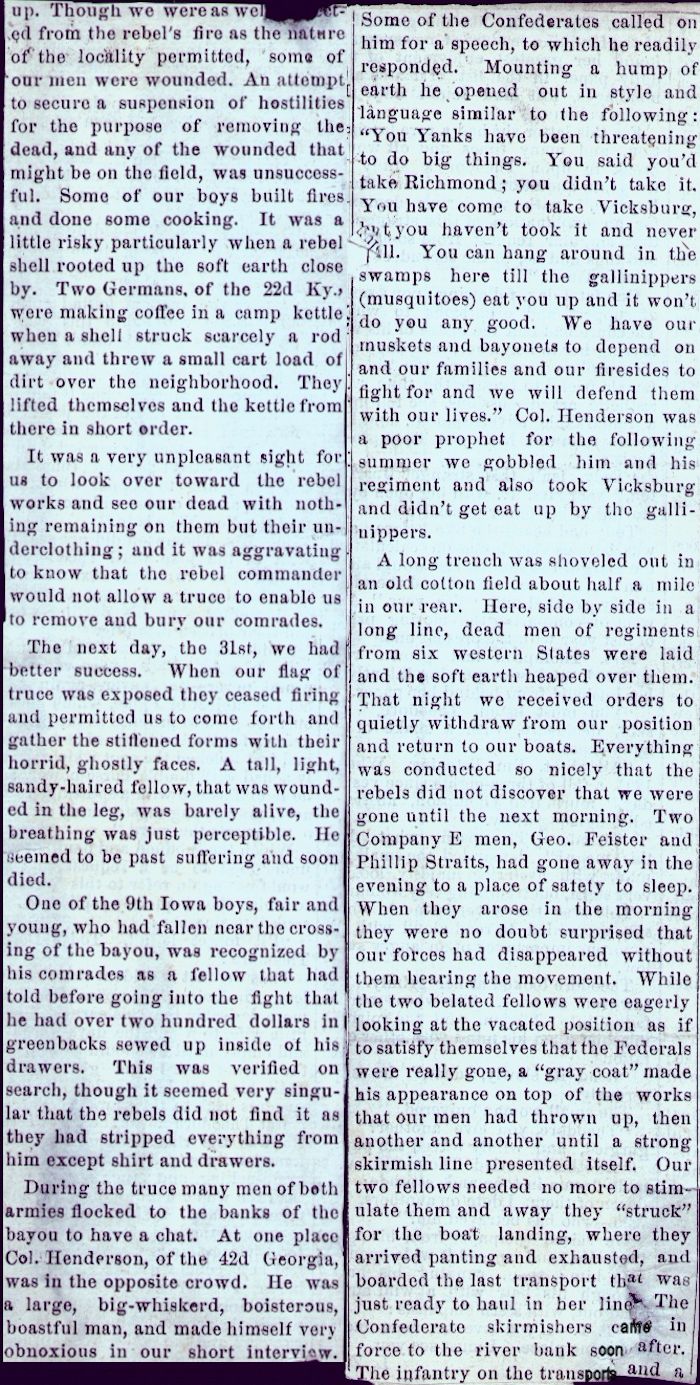| Camp & Field Page 56 | Camp & Field Index Page | 16th OVI Home Page | Camp & Field Page 58 |
The Camp & FieldArticles by Theodore Wolbach |
 Cpl. Theodore D. Wolbach |
The following image is taken from a book titled "Mortality and Statistics of the Census of 1850" in which it is believed retired Captain Rezin H. Vorhes, Company H, pasted over the pages a series of articles written by Cpl. Theodore D. Wolbach, Company E, titled "Camp and Field" and published, by chapter, in the Holmes County (Ohio) Republican newspaper from February 24, 1881 to August 17, 1882. The articles tell the story, in great detail and color, of the 16th OVI, from the inception of the 3-year regiment in October, 1861, through all its camps, battles and marches until it was disbanded on October 31, 1864. The articles pasted in the Vorhes book cover the first 35 chapters, published through October 20, 1881. All the remaining chapters were recently found in a Holmes County library by researcher Rob Garber who obtained copies, performed the transcriptions and provided to this website and which are also presented here, thus providing the complete work by Theodore Wolbach.
Throughout these articles click on the underlined white text for additional details.
The webauthor thanks 16th Ohio descendant Rob Garber for his excellent research on the Camp And Field articles and for performing the tedious digital transcription of those articles found on each page. The transcriptions were made to reflect the original articles verbatim, misspellings and all. Rob is the 3rd great nephew of Capt. William Buchanan, Company F, 16th Ohio, who served in the 90-day regiment as a private, re-enlisting in the three year regiment, and eventually making the rank of Captain of Company F. Thanks Rob!
Page 57 - Chapter 35 - December, 1862
 |
up. Though we were as well protected from the rebel's fire as the nature of the locality permitted, some of our men were wounded. An attempt to secure a suspension of hostilities for the purpose of removing the dead, and any of the wounded that might be on the field, was unsuccessful. Some of our boys built fires and done some cooking. It was a little risky particularly when a rebel shell rooted up the soft earth close by. Two Germans, of the 22d Ky., were making coffee in a camp kettle when a shell struck scarcely a road away and threw a small cart load of dirt over the neighborhood. They lifted themselves and the kettle from there in short order. It was a very unpleasant sight for us to look over toward the rebel works and see our dead with nothing remaining on them but their underclothing; and it was aggravating to know that the rebel commander would not allow a truce to enable us to remove and bury our comrades. The next day, the 31st, we had better success. When our flag of truce was exposed they ceased firing and permitted to come forth and gather the stiffened forms with their horrid, ghostly faces. A tall, light, sandy-haired fellow, that was wounded in the leg, was barely alive, the breathing was just perceptible. He seemed to be past suffering and soon died. One of the 9th Iowa boys, fair and young, who had fallen near the crossing of the bayou, was recognized by his comrades as a fellow that had been told going into the fight that he had over two hundred dollars in greenbacks sewed up inside of his drawers. This was verified on search, though it seemed very singular that the rebels did not find it as they had stripped everything from him except shirt and drawers. During the truce many men of both armies flocked to the banks of the bayou to have a chat. At one place Col. Henderson, of the 42d Georgia, was in the opposite crowd. He was a large, big-whiskerd [sic], boisterous, boastful man, and made himself very obnoxious in our short interview. |
Some of the Confederates called on him for a speech, to which he readily responded. Mounting a hump of earth he opened out in style and language similar to the following: A long trench was shoveled out in an old cotton field about half a mile in our rear. Here, side by side in a long line, dead men of regiments from six western States were laid and the soft earth heaped over them. That night we received orders to quietly withdraw from our position and return to our boats. Everything was conducted so nicely that the rebels did not discover that we were gone until the next morning. Two Company E men, Geo. Feister and Phillip Straits, had gone away in the evening to a place of safety to sleep. When they awoke in the morning they were no doubt surprised that our forces had disappeared without them hearing the movement. While the two belated fellows were eagerly looking at the vacated position as if to satisfy themselves that the Federals were really gone, a |
| Camp & Field Page 56 | Camp & Field Index Page | 16th OVI Home Page | Camp & Field Page 58 |